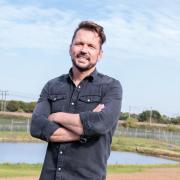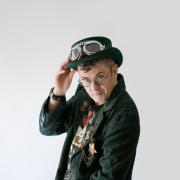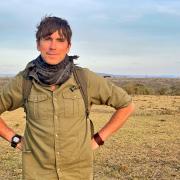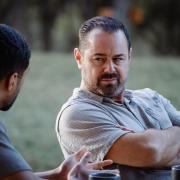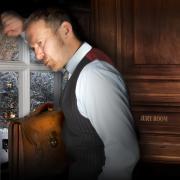David Sullivan is a self-made millionaire living a dream as the co-owner of
West Ham Utd. Pat Parker learns about his past and his plans for the future
Photography by Richard Barker
DRIVE through the electronic gates protecting David Sullivan’s palatial mansion in Theydon Bois and you’re greeted with a sight of neo-classical splendour. The impression is of a mini Buckingham Palace – although Her Majesty would be unlikely to grace her front door with a pair of gnomes sporting the West Ham Utd strip.
The gnomes reveal the former porn-baron’s lifelong passion for the Premier League club which he and his business partner, David Gold, acquired in January.
But they also reveal the multi-millionaire’s quirky side. Inside Birch Hall, which David built in the early 1990s at a cost of �7.2 million, you are greeted by two mannequin butlers while a dummy Louis Armstrong stands alongside the grand piano in the lavishly opulent lounge.
The tables are decked with glittering silver and gold Victorian racing trophies, reflecting another of David’s passions. He owns the largest collection of racing trophies in the country, including the original Grand National trophy. Photos of David’s young sons, David and Jack, adorn almost every available surface. The two boys and their mother, David’s partner and former model, Emma Benton-Hughes, spend three nights a week at Birch Hall and the rest of their time at Emma’s Georgian rectory at Stanford Rivers. ‘We’re effectively married, but we live in different houses,’ David explains. ‘It’s a funny deal, but it seems to work for us.’
He might be worth around �450 million, but the laddish 61-year-old has a chirpy, engaging, Cockney-Essex manner. He’s disarmingly proud of his house and his wealth, and has no qualms about the fact that much ofit was made from the porn industry and the notoriously racy Sport series of newspapers.
‘Every night I prayed for three things – to be a multi-millionaire, the captain of the Cardiff and Wales football teams and a world champion boxer. I achieved one, and had a go at both the others’
‘If I was selling guns or cigarettes, I might have doubts about what I’m doing,’ he tells me. ‘But adults appear in these magazines and adults buy them, and I believe that as long as you don’t hurt anybody or commit a criminal act, adults should be able to do what they like with their lives. I can’t see a problem.’
Until the age of ten, David grew up in a Cardiff council house, the son of an RAF serviceman. But even then, he dreamt of more. ‘Every night I prayed for three things – to be a multi-millionaire, to captain Cardiff and Wales at football and to be a world champion boxer. I achieved one and had a go at both the others.’
At ten, he was unexpectedly given a glimpse of how the other half lived when his father was posted to Aden, now South Yemen. ‘It was an enormous change. We moved to this big, detached house with staff. It was a very strange experience, and pretty educational.’
His father, who had joined the RAF at 14, rose to become a Wing Commander, remarkably finishing his career as assistant financial controller of NATO. But back when David was 11, the family returned after a year in Aden to Hornchurch, living on the former Air Force base. David attended Abbs Cross School and left with ten O Levels before the family moved to Hertfordshire, where he gained three A-grade A Levels at Watford Boys’ Grammar School. He read economics at Queen Mary College, only narrowly missing a first.
He started working in advertising, but was already making ten times more by selling soft porn mail order photos. A millionaire by 25, he and his partner, David Gold, expanded into the adult entertainment industry, opening sex shops, publishing adult magazines and producing several low-budget blue movies.
In 1986, he founded the Sunday Sport, the tabloid notorious for its made-up stories and semi-nude models, later launching the Daily Sport. ‘I thought I’d sweep the market. I thought, “If The Sun’s got two topless girls and we have 20, by Christmas we’ll be the biggest paper in the country”.’
Some accused him of taking journalism to a new low with invented stories about World War II bombers found on the moon, but, as ever, he is unapologetic. ‘We were just looking for ways to justify the sex, really. We knew people bought the Sport for the sex, but if you had a wacky story, it gave people an excuse.’
The Sunday Sport’s readership peaked at 660,000, but both papers’ circulation has plummeted since and David sold the papers for �40 million in 2007. However, he and David Gold recently bailed them out with a �1.68 million loan. The papers’ decline, he says, is due to the amount of free porn available online.
David has been a life-long fan of West Ham Utd and in the 1980s he and David Gold owned 30% of the club. ‘Because of our sex background, it was made clear to us we were not welcome,’ says David. ‘They wouldn’t give us a seat on the board.’
However, in 1993 they took over the then struggling Birmingham City FC along with David Gold’s brother, Ralph. The partners appointed Karren Brady, now an assistant on Lord Sugar’s The Apprentice, as the club’s managing director when she was only 23.
‘You have to chase your dreams sometimes. I’m doing it now with football. Life’s a game, but the more money you’ve got, the bigger part in the game you can play’
‘Karren was my apprentice,’ says David. ‘She worked for me on the Sport as head of advertising and I said to her, “Would you like to run a football club?” I knew she could do it and I also thought it would be great PR to have a young, attractive girl in charge. But it would have been a stunt unless she could do the job – and she did run it.’
Over the years, David became disillusioned with Birmingham City, finally selling the club in 2008. ‘Whatever you did for the supporters, it wasn’t enough. I think people underestimated the hours and the energy I put in. And we left behind a fantastic team, a manager and a structure that really worked. So I think we did a great job.’
In January, he and David Gold fulfilled a life-long dream by acquiring a 50% stake in West Ham Utd, later increasing it to 60%. The pair act as co-chairmen, with Karren Brady as vice-chairman. ‘They used to move me on when I was 14 for selling other clubs’ football programmes outside Upton Park, so it’s quite funny really,’ he says.
West Ham had debts of �110 million when they took it over and at the time, Sullivan and Gold stressed they would not have bought the club had they not been supporters. However, David says they have already reduced the debts to around �95 million and are looking to reduce wage bills by buying talented young players relatively cheaply and renegotiating some existing contracts.
‘We’ve got to renegotiate bonuses, because at the moment the club is actually worse off the higher you finish in the table.’ He is also hoping to attract partners to share the load. ‘I still believe anyone who invests in West Ham will treble their money within six years.’
The Hammers narrowly escaped relegation last season and in May the manager, Gianfranco Zola, was replaced by Avram Grant in whom David says he has great faith. David also hopes to move the club to the Olympic Stadium after 2012. ‘It’s a realistic hope, but it will cost �125 million to convert it to a football stadium.’ He also maintains it could possibly be used jointly as an athletics stadium, despite considerable difficulties.
Happy at homeDavid seems happy in his Essex mansion, with its elegant grounds, two swimming pools and sweeping views over a deer sanctuary and Epping Forest. He has no wish to move. ‘It’s where my roots are. Essex is very convenient – only 20 minutes from the M1. I just wish there were a few more upmarket restaurants!’
David admits his primary aim in life has been to make money, but he has other ambitions for his boys, aged ten and 12. ‘I just want them to enjoy life and have a good time. I’ve done things to make money. I’d like them to do things they want to do. You have to chase your dreams sometimes. I’m doing it now with football. Life’s a game, but the more money you’ve got, the bigger part in the game you can play. It’s easier to be happy if you’re rich than if you’re poor.’
So is he a happy man? He ponders. ‘I’m about 85% happy, which is not bad. We’re living in quite troubled, trying times – that’s probably why it’s only 85%. I do care about what’s going on in the world – people losing their jobs, people starving in Africa and the state of the country. To be 100% happy you’d have to be a simpleton or live in a cocoon. But I’m still out there chasing my dreams and having fun.’



